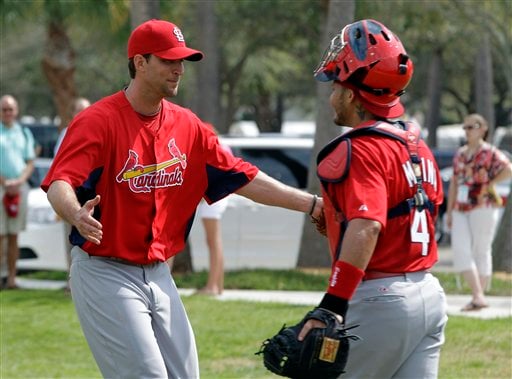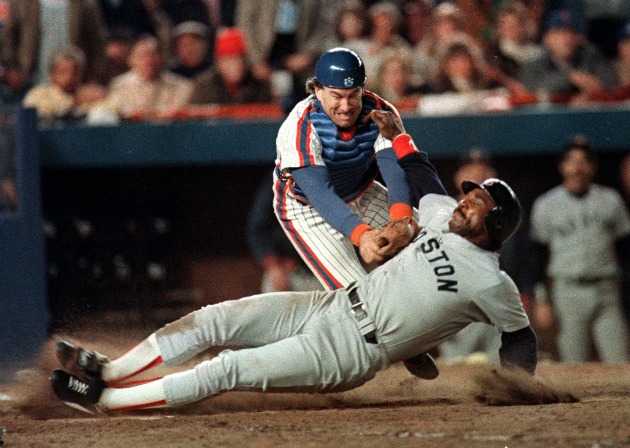There has been some concerns over new Cardinals manager Mike Matheny's lack of previous managerial experience made since he's gotten the job. He has never been a manager at any level before, and his only coaching experience has been as a guest spring training instructor. Matheny was a special assistant to GM John Mozeliak the last couple of years. I think Matheny will be fine considering he has a talented team to work with. Here's a look at rookie managers to lead their team to the playoffs since the start of division play in 1969.
Ron Roenicke, 2011 Brewers
Roenicke led the Brewers to the NL Central Division title last year after being on Mike Scoiscia's coaching staff for 11 years. He had to deal with alot of egos and strong personalities with this team and they had a 19 game improvement from 2010. Roenicke's opponent in Division Series was the Diamondbacks who had Kirk Gibson in his first full season as manager.
Dale Sveum, 2008 Brewers
I barely count this considering Sveum only managed the last 12 games of the season. For some reason they fired Ned Yost in the middle of a pennant race. Sveum went 7-5 and the Brewers won the Wild Card and lost to the Phillies in the Division Series. Sveum is now the Cubs manager.
Ken Macha, 2003 Athletics
Macha took over a team that made the playoffs three straight years and won 96 games in 2003. However, the postseason result was the same, a first round exit. Macha had the last winning season and playoff appearance for Oakland in 2006, and was not retained for the 2007 season.
Ron Gardenhire, 2002 Twins
Longtime Twins manager Tom Kelly retired after the 2001 season and his longtime assistant Gardenhire replaced him. In 2002, the Twins won the AL Central and made it to the ALCS. Gardenhire's teams has won 6 division titles total but he has a 6-21 record in the postseason.
Bob Brenly, 2001 Diamondbacks
Brenly was a broadcaster before becoming the DBacks manager in 2001. Led by Randy Johnson, Curt Schilling, and Luis Gonzalez the DBacks won their first World Series championship.
Larry Dierker, 1997 Astros
Dierker pitched for the Astros in the 60s and 70s before becoming a broadcaster for the team. In 1997 he was named manager of the team replacing Terry Collins. The Astros won a weak NL Central in 1997 and they were promptly swept by the Braves in the Division Series. Dierker's teams won the NL Central 4 out of 5 years he was manager, but they only won 1 playoff game during his run.
Bill Russell, 1996 Dodgers
Tommy Lasorda had to retire due to health problems in the middle of 1996 and longtime Dodger player and coach Bill Russell took over as manager. The Dodgers won the Wild Card and were swept in the Division Series in 1996. They were in the chase for the NL West title in 1997 but fell short to their archrival Giants. Russell was fired in 1998 by new ownership.
Cito Gaston, 1989 Blue Jays
The Jays fired Jimy Williams after stumbling out the gate in 1989. Gaston took over and went 77-49 the rest of the way and Toronto won the AL East. They lost to the Bash Brothers from Oakland in the ALCS that year. However, Gaston's teams returned to the postseason 3 more times and the Jays won back to back World Series titles in 1992 and 1993.
Joe Morgan, 1988 Red Sox
This is the other Joe Morgan, the white one who couldn't play baseball well. Morgan took over the Sox in midseason and piloted them to the AL East title. Morgan's Sox also won the 1990 division title, but both times they were swept by the A's. Morgan was fired after 1991 despite a second place finish.
Tom Kelly, 1987 Twins
Technically, Kelly managed the Twins briefly at the end of the 1986 season. In his first full season, the Twins won a weak AL West with a 85-77 record. They upset the favored Tigers in the ALCS, and beat the Cardinals in 7 games in the World Series. The 1987 Twins have the second worst record of any World Series winner(the 2006 Cardinals have the worst). In 1991, the Twins returned to the playoffs and won the World Series again in 7 games over the Braves. Kelly was also manager of the Twins when Hall of Famers Dave Winfield and Paul Molitor joined the 3000 hit club.
Jim Fanning, 1981 Expos
The Expos fired Hall of Fame manager Dick Williams in the middle of a pennant race in 1981. His hard driving style was alienating Expos players and the easygoing Fanning was hired as a replacement. The 1981 season was a strike year, and baseball had a split season format for the first and hopefully last time. All games that happened before the strike were the first half and all games after the strike was the second half. Ironically, the Cardinals had the best overall record in the NL East but missed the playoffs because they didn't win the first half of second half of the division. The Expos did win the second half in the NL East and beat the Phillies in the division round of the playoffs. The Expos nearly beat the Dodgers in the NLCS, but Rick Monday's home run clinched it for the Dodgers.
Dick Howser, 1980 Yankees
George Steinbrenner liked to change managers frequently with the Yankees until Joe Torre came along. Howser won 103 games and the AL East in his rookie season in 1980. But the Yankees were swept by the Royals in the ALCS and Howser was fired after that. Howser eventually became the Royals manager himself and led them to their only World Series championship in 1985.
Tommy Lasorda, 1977 Dodgers
Lasorda took over for legendary manager Walt Alston who had managed the Dodgers since 1954 and won 4 championships with them. Lasorda turned out to be a Hall of Fame manager himself and took the Dodgers to the playoffs 7 times. The Dodgers lost in the World Series in Lasorda's first two years in 1977 and 1978, but they came back to win it against the Yankees in 1981. The Dodgers won the World Series again in 1988 despite being huge underdogs. That team was basically Orel Hershiser, Kirk Gibson, and smoke and mirrors.
Bill Virdon, 1972 Pirates
Danny Murtaugh retired after the Pirates won the 1971 World Series and former Pirates player and coach Bill Virdon took over. The Pirates returned to the playoff under Virdon but lost in the NLCS. 1972 was also Roberto Clemente's last season before his tragic death. Virdon left for the Yankees job in 1974 and Murtaugh came out of retirement to replace him.
Sparky Anderson, 1970 Reds
Anderson won 102 games in his rookie year, but the Reds fell short to the Orioles in the World Series. The Big Red Machine fell short again in the playoffs in 1972 and 1973. However, the Reds won back to back World Series in 1975 and 1976. They added Tom Seaver in 1977 to join Pete Rose, Joe Morgan, Johnny Bench, and George Foster, but they failed to make the postseason that year. Anderson was fired after 1978 despite winning 92 games because they fell short of the playoffs again. Anderson then became the Tigers manager a year later. The Tigers had a group of young talent in Alan Trammell, Lou Whitaker, Lance Parrish, Jack Morris, and Kirk Gibson. In 1984 the Tigers won 104 games and Anderson became the first manager to win World Series in both leagues. All together, Anderson managed 7 teams to the postseason, 5 World Series teams, and won 3 championships.
Billy Martin, 1969 Twins
Billy Martin's first managerial job was with the Twins in 1969 and he led them to the playoffs. However, he was fired after the season due to getting in a fight with pitcher Dave Boswell outside a bar. Martin had a knack for turning teams around, but he was quick to wear out his welcome. Martin was fired 9 times in his career, 5 times by the Yankees alone.





